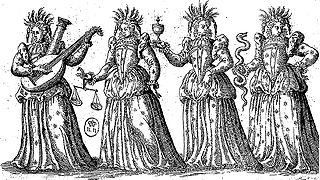
Courage is the choice and willingness to confront agony, pain, danger, uncertainty, or intimidation. Valor is courage or bravery, especially in battle.

A virtue is a trait of excellence, including traits that may be moral, social, or intellectual. The cultivation and refinement of virtue is held to be the "good of humanity" and thus is valued as an end purpose of life or a foundational principle of being. In human practical ethics, a virtue is a disposition to choose actions that succeed in showing high moral standards: doing what is said to be right and avoiding what is wrong in a given field of endeavour, even when doing so may be unnecessary from a utilitarian perspective. When someone takes pleasure in doing what is right, even when it is difficult or initially unpleasant, they can establish virtue as a habit. Such a person is said to be virtuous through having cultivated such a disposition. The opposite of virtue is vice, and the vicious person takes pleasure in habitual wrong-doing to their detriment.

The Bedouin, Beduin, or Bedu are pastorally nomadic Arab tribes who have historically inhabited the desert regions in the Arabian Peninsula, North Africa, the Levant, and Mesopotamia (Iraq). The Bedouin originated in the Syrian Desert and Arabian Desert but spread across the rest of the Arab world in West Asia and North Africa after the spread of Islam. The English word bedouin comes from the Arabic badawī, which means "desert-dweller", and is traditionally contrasted with ḥāḍir, the term for sedentary people. Bedouin territory stretches from the vast deserts of North Africa to the rocky ones of the Middle East. They are sometimes traditionally divided into tribes, or clans, and historically share a common culture of herding camels, sheep and goats. The vast majority of Bedouins adhere to Islam, although there are some fewer numbers of Christian Bedouins present in the Fertile Crescent.
Pashtunwali, also known as Pakhtunwali and Afghaniyat, is the traditional lifestyle or a code of honour and tribal code of the Pashtun people, from Afghanistan and Pakistan, by which they live. Many scholars widely have interpreted it as being "the way of the Pashtuns" or "the code of life". Pashtunwali is widely practised by Pashtuns in the Pashtun-dominated regions. Pashtunwali dates back to ancient pre-Islamic times.

The Nicomachean Ethics is Aristotle's best-known work on ethics: the science of the good for human life, that which is the goal or end at which all our actions aim. It consists of ten sections, referred to as books, and is closely related to Aristotle's Eudemian Ethics. The work is essential for the interpretation of Aristotelian ethics.

The cardinal virtues are four virtues of mind and character in both classical philosophy and Christian theology. They are prudence, justice, fortitude, and temperance. They form a virtue theory of ethics. The term cardinal comes from the Latin cardo (hinge); these four virtues are called "cardinal" because all other virtues fall under them and hinge upon them.
Hendiatris is a figure of speech used for emphasis, in which three words are used to express one idea. The phrases "sun, sea and sand", and "wine, women and song" are examples.
Aristotle first used the term ethics to name a field of study developed by his predecessors Socrates and Plato which is devoted to the attempt to provide a rational response to the question of how humans should best live. Aristotle regarded ethics and politics as two related but separate fields of study, since ethics examines the good of the individual, while politics examines the good of the city-state, which he considered to be the best type of community.

The Laches is a Socratic dialogue written by Plato. Participants in the discourse present competing definitions of the concept of courage or "manliness", ἀνδρεία in Greek.

The Banu Abs are an ancient Bedouin tribe that originated in central Arabia. They form a branch of the powerful and numerous Ghatafan tribes. They still inhabit the Arabian Peninsula and North Africa but have spread to many other regions of the world, as well. Their descendants today include the large Al Qubaisat tribe located in United Arab Emirates, Bani Rasheed tribe located in Saudi Arabia, Qatar, Yemen, Kuwait, United Arab Emirates, Oman, Sudan, Eritrea, and Jordan, and the Banu Rawaha located mostly in Oman and the UAE. They are known to be the second strongest tribe after The Prophet's Tribe. Parts of the Mahas tribe of the Butana region in Sudan are also linked by blood to the Banu Abs due to intermarriage between the Sudanese Rashaida tribe and the Mahas peoples. One of the earliest stories concerning this tribe was the famous classical love and war story of Antar and Abla.
The following outline is provided as an overview of and topical guide to the human self:
Bisha'a or Bisha is a ritual practiced by some Muslim Bedouin tribes of the Judean, Negev and Sinai deserts for the purpose of lie detection. It is also practiced, and is said to have originated among, some Bedouin tribes of Saudi Arabia. It is the best-known of various forms of trial by ordeal which are practiced by the Bedouin. It is one of the rituals in the Bedouin justice dispensary system for maintaining Sharaf - the Bedouin honor code.
Systems of justice among the Bedouin are varied among the tribes. A number of these systems date from pre-Islamic times, and hence do not follow Sharia. Many of these systems are falling into disuse as more and more Bedouins follow the Sharia or national penal codes for dispensing justice.

Virtus was a specific virtue in ancient Rome that carried connotations of valor, masculinity, excellence, courage, character, and worth, perceived as masculine strengths. It was thus a frequently stated virtue of Roman emperors, and was personified as the deity Virtus.
Nənawā́te is a tenet of the Pashtunwali code of the Pashtun people. It allows a beleaguered person to enter the house of any other person and make a request of him which cannot be refused, even at the cost of the host's own life or fortune. A similar code of conduct is used by the neighbouring Baluch people.

Tirabin al-Sana, also Tarabin, is a Bedouin village in the Negev desert in southern Israel. The village was built for the Tarabin tribe. Located near Rahat and Mishmar HaNegev, it falls under the jurisdiction of al-Kasom Regional Council. In 2022 it had a population of 1,294.
The word magnificence comes from the Latin “magnum facere”, which means to do something great. The Latin word draws on the Greek “megaloprépeia”. This noun conveys the meaning of doing something great which is fitting or seemly to the circumstance. Magnificence is a philosophical, aesthetic, and socio-economic notion deeply rooted in Western culture since classical antiquity. It regards the greatness of actions, courage, excellence, honor, generosity, and splendor of lifestyles of noble purposes.
The Adyghe Khabze or Circassian Khabze, also known as Khabzism, is the worldview and moral code of the Circassian people. Traditionally associated with the Circassian religion, which by itself is no longer dominant in Circassian society, it dictates that a Circassian must always live according to rules defined by the Khabze with little exceptions. Tenets of the Khabze include being especially respectful towards elders and women; a policy of only marrying another Circassian in order to protect the nation's endangered culture; and exemplifying the values of truthfulness, honour, and bravery. Though it draws on thousands of years of Circassian history, Khabze is evolving and ever-changing, and is reformed to fit the needs of the Circassian community. This is usually led by a thʹamaté.
In Islam, morality in the sense of "non practical guidelines" or "specific norms or codes of behavior" for good doing are primarily based on the Quran and the Hadith – the central religious texts of Islam – and also mostly "commonly known moral virtues" whose major points "most religions largely agree on". They include kindness, charity, forgiveness, honesty, patience, justice, respecting parents and elders, keeping promises, and controlling one's anger, love of God and those God loves, love of his messenger (Muhammad) and of believers.
The Lezgiwal(Lezgian: лезги́вал, []) is the worldview and moral code of the Lezgin people. Tenets of the Lezgiwal include being especially respectful towards elders and women; a policy of only marrying another Lezgin in order to protect the nation's endangered culture; and exemplifying the values of truthfulness, honour, and bravery. A Lezgin's behavior towards the environment is always subject to this law, wherever he is.









